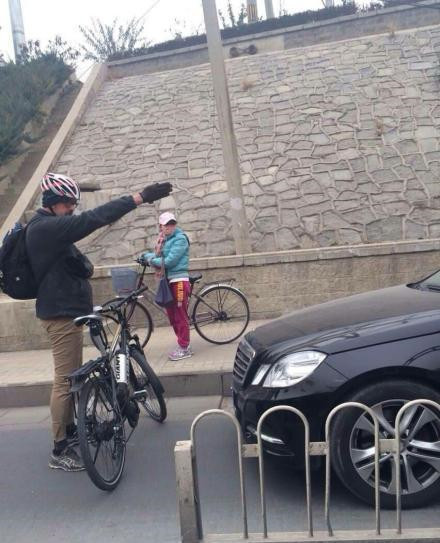The road rules of Chinese society
- By Ember Swift
 0 Comment(s)
0 Comment(s) Print
Print E-mail China.org.cn, December 1, 2014
E-mail China.org.cn, December 1, 2014
|
|
|
An expat has become a sensation on the Chinese internet after blocking a car that was trying to use a bike lane in Beijing. |
Last week, netizens were all a flutter about a foreigner who used his bike to block traffic on a Beijing road's bike lane. It is not uncommon to see cars driving in the bike lanes in the city, especially during rush hour, but on this day, this particular "laowai" had had enough. Netizens lauded his behavior, saying that he was brave to stand up to the cars, but they also suggested that he was only able to do so because he is a foreigner in China. It is an age-old argument that ultimately justifies the Chinese abdication of responsibility for their greater urban community. Is it really about culture? Or, could this just be about human bravery?
Everyone can agree that roads in Beijing - and in China in general - are often a free-for-all on which traffic rules are merely loose suggestions. Things have gotten better in this regard in recent years, but cars can still be seen driving the wrong way on one-way streets, often driving on the shoulder, quite regularly occupying imaginary parking spaces on sidewalks, and regularly driving along clearly-marked bicycle lanes. While Beijing traffic police have become stricter, the city's roads have not yet become fully regulated, and drivers still persist in disobeying traffic laws.
Because this is the way it is, Beijing residents are often surprised when people suggest that this practice be checked. If breaking rules is the norm, then what is the problem? When an interloper - i.e., a foreigner - has the gall to point it out publicly, isn't he then suggesting that Beijing is failing to adhere to its own standards? This, I believe, is the reason these photos went viral on Weibo. It's perfectly fine to turn the other cheek when "everyone does it" and pretend it is not being done improperly, but when a foreigner dares to stand up and call for Beijing to follow its own rules, there is a loss of face.
Many netizens suggested that this foreigner was braver than any Chinese person would be. They even wrote that if he had been Chinese, he would have been "beaten up" by the driver. This, surely, is a sad comment on the Chinese population: people fear that advocating rule-following will be met with physical violence! Is this perspective an attitude inherited from previous generations who were beaten for not following the rules in a much more restricted Chinese society?






